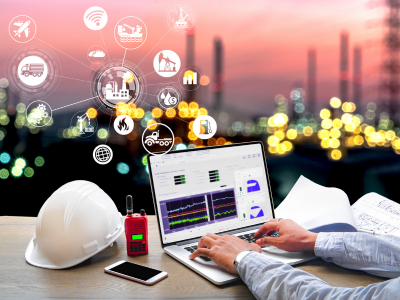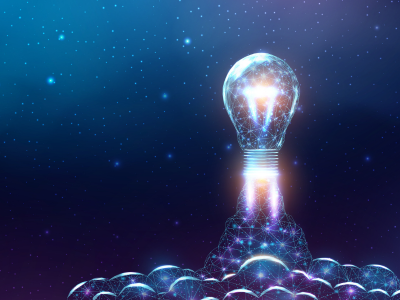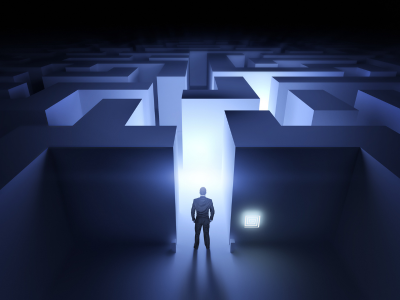Embracing the Fifth Industrial Revolution: The Dawn of a New Era
In a world that is constantly evolving, each industrial revolution has redefined how we live and work.
From the mechanization of the first Industrial Revolution to the digitalization brought by the fourth, each era has been a testament to human ingenuity. Now, as we stand on the cusp of the fifth Industrial Revolution, also known as Industry 5.0 or 5IR, it is time to embrace the unification of technologies that will transform our lives once again.
Defining the Fifth Industrial Revolution
According to the European Union, Industry 5.0 “provides a vision of industry that aims beyond efficiency and productivity as the sole goals, and reinforces the role and the contribution of industry to society. It places the wellbeing of the worker at the centre of the production process and uses new technologies to provide prosperity beyond jobs and growth while respecting the production limits of the planet.”
Industry 5.0 is marked by the seamless integration of advanced technologies like Artificial Intelligence (AI), nanotechnology, and biotechnology. It represents a new era where the physical, digital, and biological spheres merge, opening the door to groundbreaking innovations that have the potential to revolutionize industries, economies, and societies. While Industry 4.0 brought about the digitization and interconnectivity of various systems, Industry 5.0 seeks to establish a more harmonious relationship between humans and technology. This new era aims to promote sustainability and address pressing global challenges such as climate change and inequality.
Industry 4.0 ushered in intelligent technologies like AI, cloud connectivity, and real-time data analytics, which transformed the manufacturing and industrial sectors. However, Industry 5.0 strives to take these innovations a step further by placing human beings at the core of these cutting-edge technologies. By doing so, we can harness the power of AI, nanotechnology, and biotechnology for the betterment of humanity. This new era seeks to strike a balance between human creativity and automated efficiency, thereby delivering optimal results. Ultimately, Industry 5.0 aims to use these technologies to promote sustainability and tackle some of the most pressing global issues of our time.
Key Pillars of the Fifth Industrial Revolution
 Artificial Intelligence and Machine Learning: Enabling advancements in automation, robotics, and natural language processing.
Artificial Intelligence and Machine Learning: Enabling advancements in automation, robotics, and natural language processing.- Biotechnology: Redefining the boundaries of medicine, agriculture, and environmental preservation.
- Nanotechnology: Revolutionizing industries such as energy, manufacturing, and healthcare with unique material properties.
- Internet of Things (IoT): Creating a hyper-connected world with streamlined processes and optimized resource consumption.
- Human-Machine Collaboration: Augmenting human abilities for collaboration, creativity, and problem solving.
Industry 5.0’s Impact on the Space Industry
 Industry 5.0 has fostered transformative advancements in the space industry, unlocking new possibilities for exploration, communication, and resource utilization. The fusion of AI, advanced manufacturing technologies, and innovative materials has led to significant improvements in various aspects of the space industry, making space more accessible and sustainable.
Industry 5.0 has fostered transformative advancements in the space industry, unlocking new possibilities for exploration, communication, and resource utilization. The fusion of AI, advanced manufacturing technologies, and innovative materials has led to significant improvements in various aspects of the space industry, making space more accessible and sustainable.
- Democratization of Space Exploration: The integration of AI and advanced manufacturing technologies, such as 3D printing, has dramatically reduced the cost of building and launching satellites. This cost reduction has enabled more countries, private organizations, and even individuals to participate in space activities, leading to a democratization of space exploration. As a result, there has been a proliferation of innovative ideas and collaborative efforts, fueling the rapid expansion of the space industry.
- Reusable Launch Vehicles: Industry 5.0 has played a significant role in the development of reusable launch vehicles. The combination of advanced materials, AI-powered systems, and innovative engineering has made it possible to design more efficient and cost-effective reusable rockets. These innovations have not only reduced the cost of space exploration but have also minimized the environmental impact of rocket launches, promoting a more sustainable space industry.
- Advanced Satellite Technology: The space sector has also seen remarkable improvements in satellite technology, driven by Industry 5.0. AI and IoT-enabled satellite networks can now provide real-time data on a range of factors, such as climate change, natural disasters, and urbanization. These advancements have enabled better-informed decision-making and more efficient resource allocation, benefiting industries and governments alike.
- In-Orbit Servicing and Space Debris Management: Industry 5.0 technologies, such as robotics and AI, have paved the way for the development of in-orbit servicing and space debris management solutions. These capabilities allow for the repair, refueling, and upgrading of satellites in space, extending their lifespans and reducing space debris, which is essential for the long-term sustainability of space operations.
- Space-Based Solar Power: The convergence of advanced technologies in Industry 5.0 has accelerated the development of space-based solar power systems. These systems can collect solar energy in space, where sunlight is more abundant, and transmit it back to Earth as a clean, sustainable source of energy. This has the potential to revolutionize the energy industry and contribute to a greener future.
- Lunar and Martian Colonization: Industry 5.0 is fostering new opportunities for human settlement in space. The combination of human expertise and cutting-edge technology is facilitating the development of advanced life support systems, sustainable habitats, and efficient transportation methods for future lunar and Martian colonies. As we continue to push the boundaries of human exploration, Industry 5.0’s role in the space sector will only become more prominent.
Potential Impacts and Challenges
 Industry 5.0 will have a profound impact on various aspects of our lives, from sustainability and education to healthcare and governance. As AI and automation continue to transform the job market, the emphasis will be placed on creativity, critical thinking, and adaptability, ensuring that humans remain a vital part of the workforce. Industry 5.0 will also raise complex questions about privacy, security, and the ethical use of technology, requiring new governance and ethical frameworks. Ensuring equitable access to technology, education, and resources will be crucial to avoid exacerbating existing disparities and to promote a more inclusive society.
Industry 5.0 will have a profound impact on various aspects of our lives, from sustainability and education to healthcare and governance. As AI and automation continue to transform the job market, the emphasis will be placed on creativity, critical thinking, and adaptability, ensuring that humans remain a vital part of the workforce. Industry 5.0 will also raise complex questions about privacy, security, and the ethical use of technology, requiring new governance and ethical frameworks. Ensuring equitable access to technology, education, and resources will be crucial to avoid exacerbating existing disparities and to promote a more inclusive society.
Industry 5.0 holds immense promise in terms of innovation, sustainability, and social progress. However, it also presents significant challenges that must be addressed proactively. Concerns around job displacement, privacy, and security will persist, and ensuring equitable access to emerging technologies will be critical to prevent widening social and economic disparities.
As we face the opportunities and challenges presented by Industry 5.0, it is essential for individuals, businesses, and governments to adapt, collaborate, and harness its potential for the betterment of humanity. Embracing Industry 5.0 signifies the dawn of a new era, redefining the way we live, work, and interact with each other and the world around us.
The fifth Industrial Revolution ushers in a new chapter in human history, where the boundaries between the physical, digital, and biological realms blur. Industry 5.0 offers unparalleled opportunities for innovation, progress, and prosperity while also posing unique challenges that demand our collective wisdom and foresight.
Navigating this thrilling yet uncertain landscape necessitates cooperation among individuals, businesses, and governments in pursuit of a shared vision. By promoting collaboration, inclusivity, and ethical considerations in the development and deployment of new technologies, we can ensure that Industry 5.0 benefits all of humanity, without leaving anyone behind.
Industry 5.0 holds the potential to redefine our conception of humanity, fostering a more interconnected, intelligent, and compassionate world. Embracing the transformative power of this new era provides us with the opportunity to shape a future reflecting our highest ideals and aspirations, laying the groundwork for generations to come.